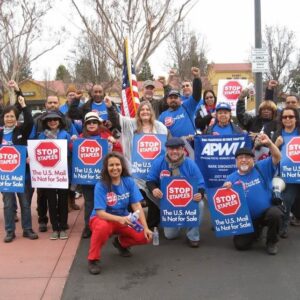March 1, 2017
Starting 2017 with a Bang!
(This article first appeared in the March-April 2017 issue of The American Postal Worker magazine.)
By Industrial Relations Director Vance Zimmerman
I was never a more proud member of the American Postal Workers Union (APWU) than when news broke that together we secured victory in the long and hard fought battle with Staples. It is inspiring to reflect on the unity displayed from coast to coast. Our union sisters and brothers waged a steady, forceful and diligent pressure campaign on both Staples and the USPS, leading to the stoppage of the subcontracting of our retail work.
For three years, you reached out to the general public, spoke with Staples managers and attended community events where you garnered support for our Stop Staples campaign. Through those efforts, many other unions, local governments and other organizations joined the Staples Boycott. There is no doubt your actions, such as participating in demonstrations, asking the public to take part in the postcard signing campaign (as well as mailing your own postcard) and speaking to people about why they should not shop at Staples, helped bring this program to a halt.
The solidarity our members, other unions and the community showed by standing together is inspiring. I want to thank all the union brothers and sisters who supported the Staples fight. You made a difference! Although the American working class still faces many struggles, the unity I saw over the last three years makes me confident that the APWU is up for any challenge we will face presently and in the future.
LMOU for Members-at-Large
On Dec. 22, 2016, the APWU completed negotiations and secured an agreement on the Local Memorandum of Understanding (LMOU) for APWU Members-At-Large without a local union structure. These are members who work in small offices and are not represented by a local, district or state Local Memorandum of Understanding (LMOU).
For these members, the same items a local can negotiate with USPS management are discussed and agreed to at the national level. Your union successfully overcame some of the challenges members who work in these offices face. The agreement helps define that stand alone Associate Offices, as well as Administrative Post Offices (APOs) and their Remotely Managed Post Offices (RMPOs), will be considered one installation.
This is important for many reasons, especially for the choice vacation selection and requests for incidental leave. Now for the choice vacation period no less than one person, but at least 15% of all APWU bargaining unit positions by craft in the installation, will be allowed off.
Excluding the month of December, incidental leave will also be granted in accordance with the same percentages, including anyone already scheduled off for the choice vacation. Requests for incidental leave must be acted upon and returned to the employee within 72 hours of receipt by management. If not, the leave is to be considered approved.
It was a team effort by your APWU officers to secure this successful agreement. President Dimondstein, multiple Regional Directors, Division Directors and other craft officers advised, gave input and contributed.
Decreasing Grievance Backlog
We are all working together on the goals for 2017 that I wrote about in my last article. One goal we are taking significant steps forward on is decreasing the grievance backlog at all levels. The first thing that needed to be addressed is completed. With input from the National Officers, Regional Directors and National Business Agents, arbitration panels are now set both regionally and nationally. With panels set in all areas, we can begin moving your grievances through the process and getting final resolution on your cases.
The second step to reduce the backlog is going through the grievances and seeing which ones can be resolved without being arbitrated. President Dimondstein reached an agreement with the Postal Service to address this issue by reviewing the outstanding cases we have in the system. There is an ongoing effort to review where backlogs exist and prioritize what areas of the country need attention. Various officers are tasked with this important assignment. As areas are identified, teams from the union and the USPS are trying to resolve as many grievances as possible. Multiple locations are identified and the reviews are already scheduled. Where an agreement cannot be reached, cases are scheduled for arbitration.
Right now, there is a particular focus on removal cases. Members have been out of work for a long period of time and they deserve to have their cases heard. We are progressing towards completing this goal.
By both filling the arbitration panels and reviewing the backlog we believe that we can successfully reduce it. Doing so will give all of you who filed grievances the justice you deserve.
Leave to Participate in Caucuses
In December 2016, the APWU intervened in a grievance the National Association of Letter Carriers (NALC) was arbitrating at the national level. The NALC challenged the denial of a carrier’s request for administrative leave to attend and vote in his Nevada Caucus (the APWU has a similar case regarding the Iowa Caucuses).
Under the Employee and Labor Relations Manual (ELM), the USPS grants leave for employees to vote in primary or general elections as part of a broader policy encouraging employees’ civic engagement. The Postal Service claims this policy does not apply to employees attending political caucuses. Their case focused primarily on the ELM language that the Postal Service interprets to being limited to secret ballot elections. They also argued caucuses are time intensive, can involve other party issues and are political parties’ private affairs, which are not regulated by law.
In response to these claims the NALC focused on the language of the ELM, specifically how the USPS’s reading conflicts with the broader policy of encouraging employee engagement in elections. The APWU presented evidence demonstrating how caucuses must meet state law and requirements in the U.S. Constitution. The evidence also showed when management granted administrative leave for caucuses in the past and it explained how this change in policy may potentially have an unfair impact on thousands of bargaining unit employees who live in states where the caucus system is utilized. We also presented testimony about the Iowa Caucuses, dispelling several misconceptions about how the political meetings work. The union is currently awaiting a decision.


